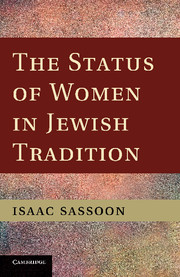Book contents
- Frontmatter
- Contents
- Preface
- Acknowledgements
- Glossary
- Abbreviations
- PART I MONOGAMY
- 1 The Sources
- 2 Pro-CD Arguments
- 3 Anti-CD Arguments
- 4 Indeterminate Arguments
- 5 Make-or-Break Argument
- 6 Which Way Does the Evidence Point?
- 7 Gen 1:27–29 Revisited
- PART II COMMANDMENTS (MIṢVOT)
- PART III INTRINSIC EQUALITY
- Conclusion
- Bibliography
- Index of Authors (Medieval & Pre-modern)
- Index of Citations from Rabbinic Literature
- Index of Names (Hebrew Bible)
- Index of Names (Talmudic)
- General Index
4 - Indeterminate Arguments
Published online by Cambridge University Press: 01 June 2011
- Frontmatter
- Contents
- Preface
- Acknowledgements
- Glossary
- Abbreviations
- PART I MONOGAMY
- 1 The Sources
- 2 Pro-CD Arguments
- 3 Anti-CD Arguments
- 4 Indeterminate Arguments
- 5 Make-or-Break Argument
- 6 Which Way Does the Evidence Point?
- 7 Gen 1:27–29 Revisited
- PART II COMMANDMENTS (MIṢVOT)
- PART III INTRINSIC EQUALITY
- Conclusion
- Bibliography
- Index of Authors (Medieval & Pre-modern)
- Index of Citations from Rabbinic Literature
- Index of Names (Hebrew Bible)
- Index of Names (Talmudic)
- General Index
Summary
1) Lev 20:10 deals with adultery: “A man who commits adultery with a married woman, who commits adultery with his neighbour's wife, the adulterer and the adulteress shall be put to death”. There is no parallel verse outlawing relations between a woman and a married man. But if the Priestly Torah meant to ban polygyny – so the objection – would Lev 20 not have included precisely such a parallel prohibition? Perhaps. But one must ask oneself whether in banning polygyny P is likely to have made it a capital crime or even to have tarred it with the opprobrium of adultery. Had P's anti-polygyny legislation been more fervent, Jewish marriage might have taken a very different course. Moreover, those who read Lev 18:18 as banning not polygyny but the marriage of a man to his wife's biological sister are every bit as flummoxed by the omission of that incestuous union from chapter 20. Lev 18:18 simply has no counterpart in Lev 20. If anything, it is easier to explain the absence of a polygyny ban than an incomplete register of incestuous relations. After all, polygyny had not been frowned upon in early Israel as far as we know; and Lev 20 may represent a less radical position than Lev 18 (see further). We have therefore classified this argument as indeterminate.
2) Union between a man and his wife's sister could be inferred by analogy from verse 16 that prohibits union between a woman and her husband's brother.
- Type
- Chapter
- Information
- The Status of Women in Jewish Tradition , pp. 19 - 23Publisher: Cambridge University PressPrint publication year: 2011



